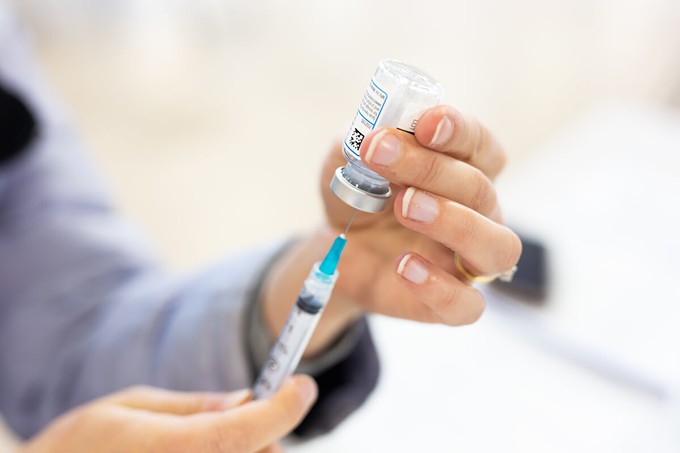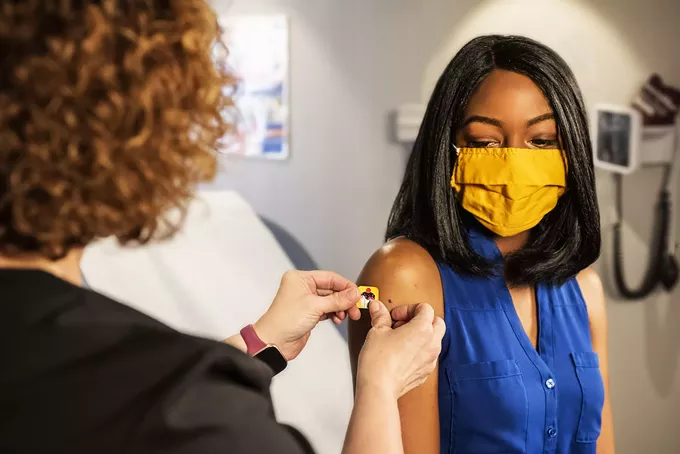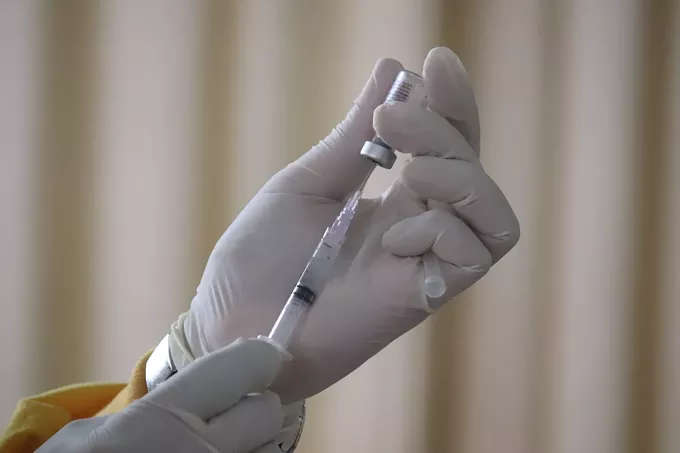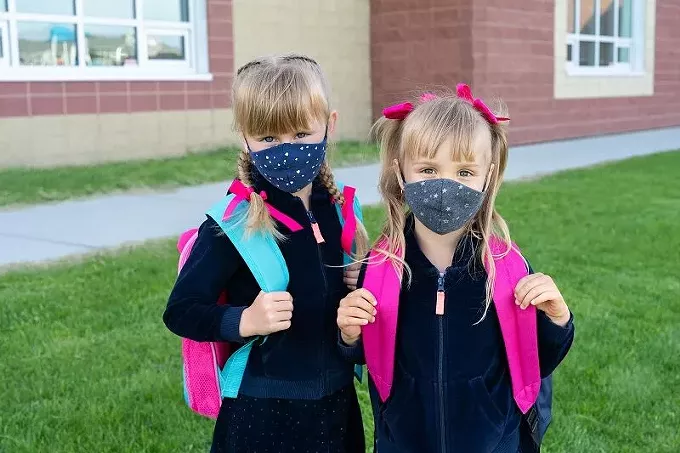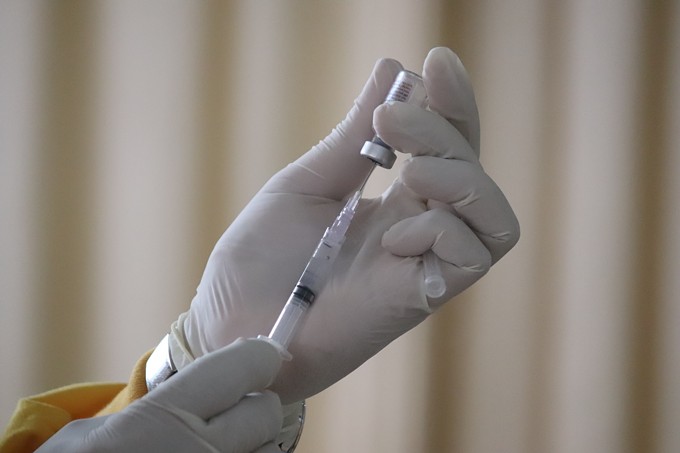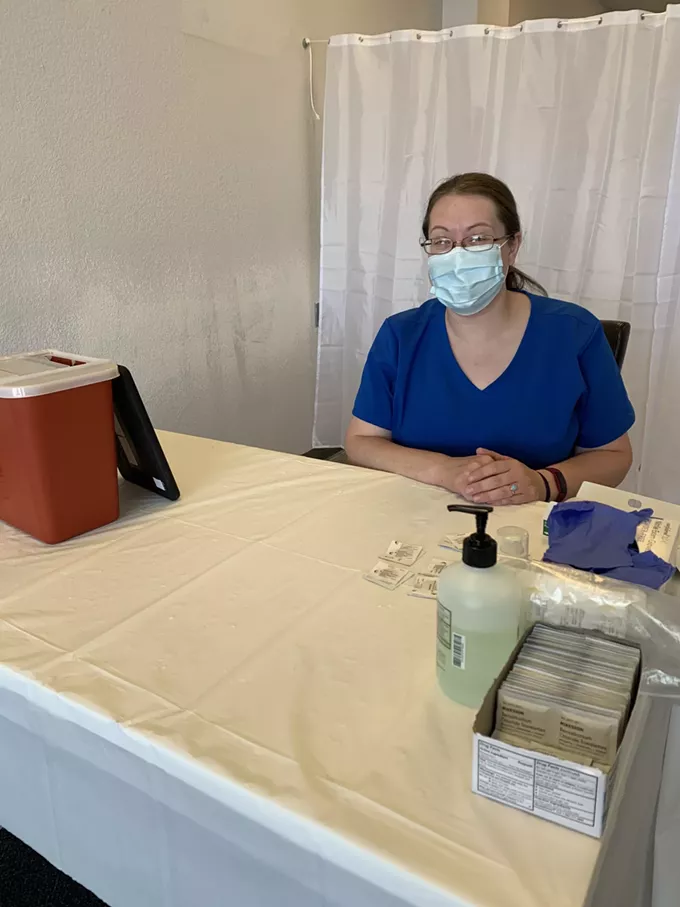Wednesday, October 27, 2021
WASHINGTON — The next wave of the massive COVID-19 vaccination campaign could begin as soon as next week, after federal regulators decide if elementary school students across the U.S. should begin rolling up their tiny sleeves.
That multistep approval process kicks off Tuesday, when the Food & Drug Administration’s panel of vaccine experts will vote on whether the benefits of Pfizer’s COVID-19 vaccine outweigh the risks for kids ages 5 to 11.
If the panel and top FDA officials grant an emergency authorization for vaccinating that age group, then the next step lies with the Centers for Disease Control and Prevention. A CDC panel would meet on Nov. 2 and 3 to craft additional guidance on how the shot would be used.
For parents with children in that age group, that could mean a vaccination appointment for their child as soon as Nov. 4. The Biden administration has said there will be 15 million doses ready to ship as soon as the FDA gives the green light.
In recognition of the difficulty parents may have deciding whether to obtain a vaccine, the administration also is taking care to connect parents with trusted providers like pediatricians. “These are our babies, and they still feel like a baby when they’re that age and that size,” said Amy Wimpey Knight, president of the Children’s Hospital Association.
Tuesday, October 26, 2021
The Pima County Health Department is now offering all three types of COVID-19 boosters to eligible individuals at its health clinics, vaccination PODs and mobile clinics.
The Centers for Disease Control and Prevention on Oct. 21 approved the boosters after previously authorizing the Pfizer booster. The CDC is also allowing people to choose which booster they receive.
If you completed two doses of Pfizer or Moderna at least six months ago, you are eligible for a booster if you are:
- 65 years or older
- 18+ and live in long-term care settings
- 18+ and have underlying medical conditions
- 18+ and work or live in high-risk settings for exposure to COVID-19
If you initially received a J&J shot, boosters of any vaccine type are recommended for those 18 and older and who were vaccinated at least two months ago.
Find a complete list of Pima County health clinics and mobile sites, with days and hours of operation, at www.pima.gov/covid19vaccine. The vaccine is free, and no ID is required at County sites.
All three vaccine booster types also are widely available at pharmacies. Check on locations and vaccine type available on the Arizona Department of Health Services webpage and at vaccines.gov.
Tuesday, October 19, 2021
Associate Professor Deepta Bhattacharya joined the University of Arizona status update on Monday, Oct 19, to highlight new vaccine research and discuss the controversial debate over booster shots.
Before the delta variant mutated from the original COVID-19, the coronavirus mRNA Pfizer and Moderna vaccines had extremely high efficacy. Bhattacharya said the vaccines made people 20 times less likely to get infected than unvaccinated individuals. Delta lowered vaccine efficacy to where vaccinated individuals are now two to five times less likely to get COVID.
According to Bhattacharya, this is due to the delta’s high transmissibility. The delta variant is two to three times more transmissible than the original virus. Bhattacharya warned delta has completely changed the game for the unvaccinated.
“A year ago you might imagine that there were some scenarios if you’re careful if you mask, if you stay away from other people, you might be able to avoid the virus even if you hadn’t been vaccinated,” Bhattacharya said. “I don’t think with the transmissibility of delta as it is right now that is very likely, eventually, the virus will get you if you are not vaccinated.”
Pima County is still considered to be a highly transmissible area, according to the Pima County Health Department. Dr. Joe Gerald from the University of Arizona reported in his weekly COVID-19 update that as of Oct 3, the highest cases of infection are coming from the 15 to 24 age group. The lowest COVID cases are coming from the age group of 65 and older. This group has the highest rate of vaccination.
New research is showing the vaccines are reducing transmission of the virus, including the delta variant. Bhattacharya said a contact tracing study revealed vaccinated individuals are two-thirds less likely than an unvaccinated person to transmit the virus to someone else.
Thursday, October 7, 2021
The Pima County Board of Supervisors voted 3-2 on Tuesday against mask requirements for K-12 schools in Pima County.
Supervisor Matt Heinz presented the proposal for masks in schools in response to research from the Centers for Disease Control and Pima County.
Pima County recently co-authored a study with the CDC that found K-12 schools without mask requirements in Pima and Maricopa counties were 3.5 times more likely to have a COVID outbreak than schools with mask mandates.
“In light of the information that literally came from this county and Maricopa County in Arizona and the CDC,” Heinz said, “I think it makes a lot of sense for us to take a look at this again.”
Heinz reiterated his view that masks protect students and teachers from COVID and that data supported his opinion.
Dr. Francisco Garcia, Pima County's chief medical officer, was asked to discuss the potential mandate with all 12 school district superintendents in Pima County. He presented their feedback during the board's regular meeting.
Thursday, September 30, 2021
The Marana Unified School District Governing Board ended their special meeting on Wednesday with no action on requiring face masks on Marana school campuses.
Board member John Lewandowski called the Sept. 28 emergency meeting on the previous day and planned to make a motion for the institution of a mask mandate. Marana school campuses have gone to mask-optional status since their previous mandate ended on Sept 29.
New data from a recently released study by the CDC, co-authored with Pima County, showed K-12 schools without mask requirements were 3.5 times more likely to experience a COVID outbreak. Data was taken from 999 public schools in Pima and Maricopa counties.
Board member Hunter Holt surprised the Board on Wednesday by making a motion to relinquish the authority to institute a mask mandate to Superintendent Dr. Dan Streeter.
“My motion is to give Dr. Streeter sole authority to implement and remove any sort of mask mandate from here on out,” Holt said.
Holt said he trusted Streeter to make the proper decision. He also said that COVID case numbers have improved in Marana. The Arizona Department of Health Services has recorded a slow decrease of overall COVID cases in Pima County since the August surge. Pima County K-12 schools are still considered to have high transmissibility, according to ADHS.
“This is really ridiculous. John called this meeting so the five of us could vote on re-imposing a mask mandate and now Hunter has come in from left field and has thrown this curveball,” said board member Tom Carlson. "Obviously, Dr. Streeter doesn’t know what to say on this.”
Streeter seemed confused by the surprise motion and recommended the Board vote no. The motion to give Streeter mandate authority failed.
Lewandowski then asked the board to extend the mask mandate. The motion was not seconded. Marana Unified School District will remain mask-optional until the board decides otherwise.
“I was very disappointed,” Lewandowski said after the meeting.
“I thought I was doing what was in the best interest of kids and staff for safety.”
Lewandowski pledged to ask Board President Dr. Maribel Lopez to revisit the subject at a future meeting but said she could choose not to include it.
Tuesday, September 21, 2021
Monday, September 20, 2021
WASHINGTON — More than 20 Republican state attorneys general are threatening to sue the Biden administration over its mandate that large employers require their employees to either be vaccinated against the coronavirus or undergo weekly testing.
In a Thursday letter, the 24 AGs pushed the administration to remove the requirement that would affect nearly 80 million Americans and instead let employees make their own decisions on vaccinations.
“There are many less intrusive means to combat the spread of COVID-19 other than requiring vaccinations or COVID-19 testing,” they wrote. “The risks of COVID-19 spread also vary widely depending on the nature of the business in question, many of which can have their employees, for example, work remotely.”
On Sept. 9, President Joe Biden instructed the Department of Labor to issue a temporary emergency rule under the Occupational Safety and Health Act to mandate that employers either put in place a vaccine requirement, mandate weekly COVID-19 testing or fire employees who refuse to get vaccinated.
He later met with business leaders “who champion vaccine mandates that will. . .make sure that we keep businesses open and workers safe,” he said, underlining the mandate support from a traditionally Republican group.
The state attorneys general argue that Biden’s mandate is not legal.
“If your Administration does not alter its course, the undersigned state Attorneys General will seek every available legal option to hold you accountable and uphold the rule of law,” they wrote.
Thursday, September 9, 2021
Health officials urged people to get the flu vaccine in response to unexpectedly high cases of seasonal illness.
Pima County has two "mu variant" COVID cases and 150 influenza cases, said County Public Health Director Dr. Theresa Cullen at a press conference on Wednesday.
Cullen said "mu" has been deemed a “variant of interest” by the Centers for Disease Control. The Delta variant is the most prolific variant in the United States and is labeled a “variant of concern” by the CDC.
Cullen qualified the number flu cases, saying the number is probably higher because most people won’t get tested and will get treatment before a case can be reported.
“As we enter this flu season, we remain concerned that we will see an acceleration of the cases compared with last year, it's important for people to remember that you could get COVID and influenza at the same time,” Cullen said.
She recommended that Pima County residents get COVID and flu vaccines in the next two months to prepare for winter viruses. Flu vaccines are readily available throughout Tucson at local pharmacies and grocery stores.
Parents should also be aware of the respiratory syncytial virus. Chief Clinical Officer Dr. Marjorie Bessel at Banner Health said RSV hospitalizations and ER visits have increased rapidly in the past four days.
“As a reminder, this is an unseasonable spike. Typically, RSV is not a big concern during summer months,” Bessel said.
A strong majority of Arizona voters — but only a small fraction of Republicans — support face mask mandates and vaccine requirements in schools and government buildings to combat the spread of COVID-19, according to a new poll commissioned by organizations representing school boards and public health professionals.
In the live-caller poll of 400 voters deemed likely to vote in next year’s general election, 57% of respondents said people should definitely or probably be required to wear face masks in local government facilities, and public schools. Nearly 41% said people should not be required to wear masks in those settings.
And 53% of respondents said those institutions should also be allowed to determine their own policies on face mask mandates, compared to nearly 43% who said they shouldn’t.
The poll was conducted by the Republican lobbying and political consulting firm HighGround on Aug. 30 and 31.
A new state law that goes into effect on Sept. 29 prohibits district and charter schools from requiring face masks. Several education and other advocacy groups, including the Arizona School Boards Association, which commissioned the poll, are challenging that law in court.
Voters took a similar view of vaccine mandates. Nearly 54% said private businesses should be able to require employees to show proof of vaccination against COVID-19, while 42% said employers shouldn’t be permitted to do that. And more than 52% said local governments and public schools should be able to impose that requirement, compared to nearly 45% who said they shouldn’t have that power.
Wednesday, September 8, 2021
If you’ve had trouble paying for prescription medicine for yourself or family members — regardless if you are insured or not — you aren’t alone. Americans pay three times more for medications than people in other countries. As the cost of lifesaving medications like insulin skyrocket, Arizonans face impossible tradeoffs, like deciding whether to pay rent or to purchase the medications that keep them alive.
The COVID-19 pandemic has further laid bare the inequities in our health system, and now more than ever, we must be working together to lower health care costs for everyone. Particularly, we must focus on communities disproportionately impacted by the high cost of drugs: Seniors, women, communities of color, and even children are especially vulnerable to these skyrocketing costs.
It doesn’t always have to be this way. The US has historically emphasized patent exclusivity as an incentive to drug makers. This tilts the table heavily in the favor of drug companies, which essentially maintain monopolies on popular drugs for extended periods of time. While it is important to foster competition to promote innovation, the current system is having the opposite effect. Individual consumers often have no alternative drug choice, and even when multiple options are available, it may be the insurer rather than the patient and physician who make the ultimate decision about which medication is best for the patient.
It is not uncommon in my emergency medicine practice to see patients who are struggling to pay for medications. In some cases, they personally try and “prioritize” which medications they can afford to take and which they cannot. In the worst case, this might mean a patient taking no medications at all for extended periods of time.
The net effect is patients who are sicker than they have to be, with poorly controlled diseases. For a diabetic patient, this might mean the difference between manageable foot care and an amputation due to difficulties with blood sugar control. For a patient with heart or vascular disease, not “prioritizing” their anticoagulant (blood-thinning) medications can result in stent occlusion (blockage) and a recurring heart attack or loss of limb. And whether patients make better or worse guesses about which medications to prioritize, the reality is their doctors would not prescribe medications that are not necessary, so any trade-off is a gamble on future health.
Working to lower the cost of prescription drugs is more than just the right thing to do — it's overwhelmingly popular with voters across the political spectrum. A January 2021 Morning Consult poll found that 96% of voters said lowering drug prices is an important challenge facing Americans. Despite countless promises to take action, for four long years, former President Trump and his Republican allies in Congress blocked proposed Democratic reform addressing this very issue at every turn. Instead, they rewarded Big Pharma companies — and their CEOs — with record profits.
In his first address to the Joint Session of Congress, President Biden struck a markedly different tone: “Let’s give Medicare the power to save hundreds of billions of dollars by negotiating lower drug prescription prices,” he said. “Let’s do it now.” Democrats in the House of Representatives are following his lead.
In late April, House Democrats reintroduced H.R.3, the Elijah E. Cummings Lower Drug Costs Now Act. This bill would allow Medicare to negotiate lower prices on behalf of all Americans — not just those on Medicare — which is the single most effective way to reduce drug prices. It also establishes strong protections against price gouging and redirects more funding to the National Institutes of Health (NIH) for life-saving research and development. Finally, H.R.3 would also penalize drug companies that increase prices faster than the rate of inflation, a shockingly common practice.
Insights from a Gallup survey show the American public supports the provisions in H.R.3 meant to lower the cost of prescription drugs. Separate polling conveys that 93% of respondents — Democrats, Republicans, and independents alike — support giving Medicare the power to negotiate with drug companies for lower prices.
It’s horrifying to know there are Arizonans who ration their medications or delay care because the costs are too high. Legislation like H.R.3 would help change that reality for millions of people and reform is long overdue. With President Biden’s support, we can get this done. Now is the time for Congress to take bold action and pass this bill.


